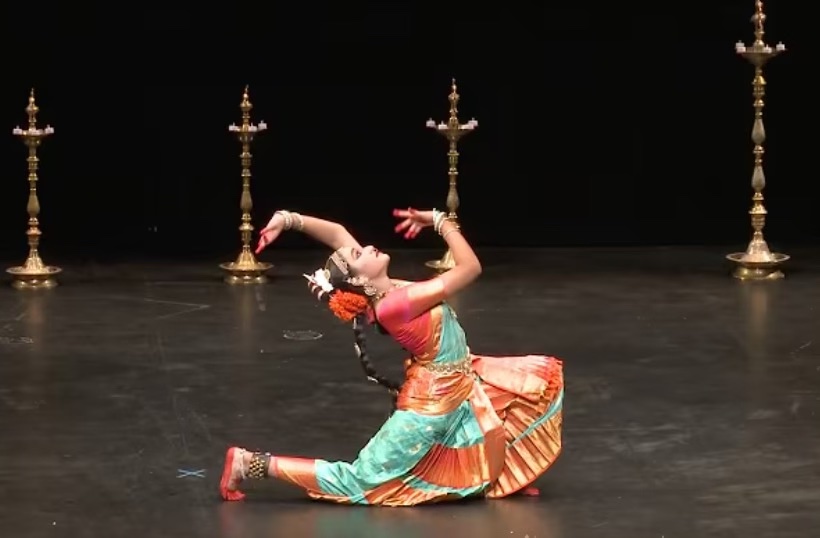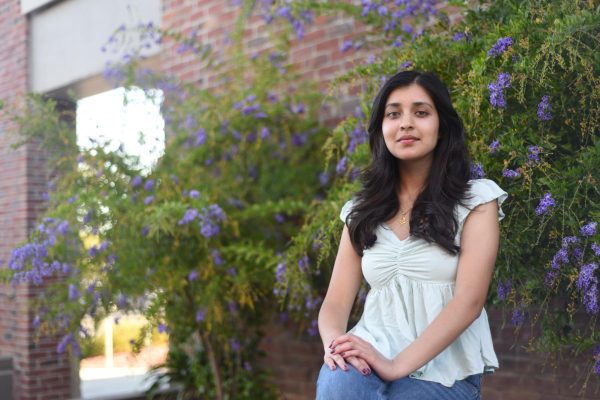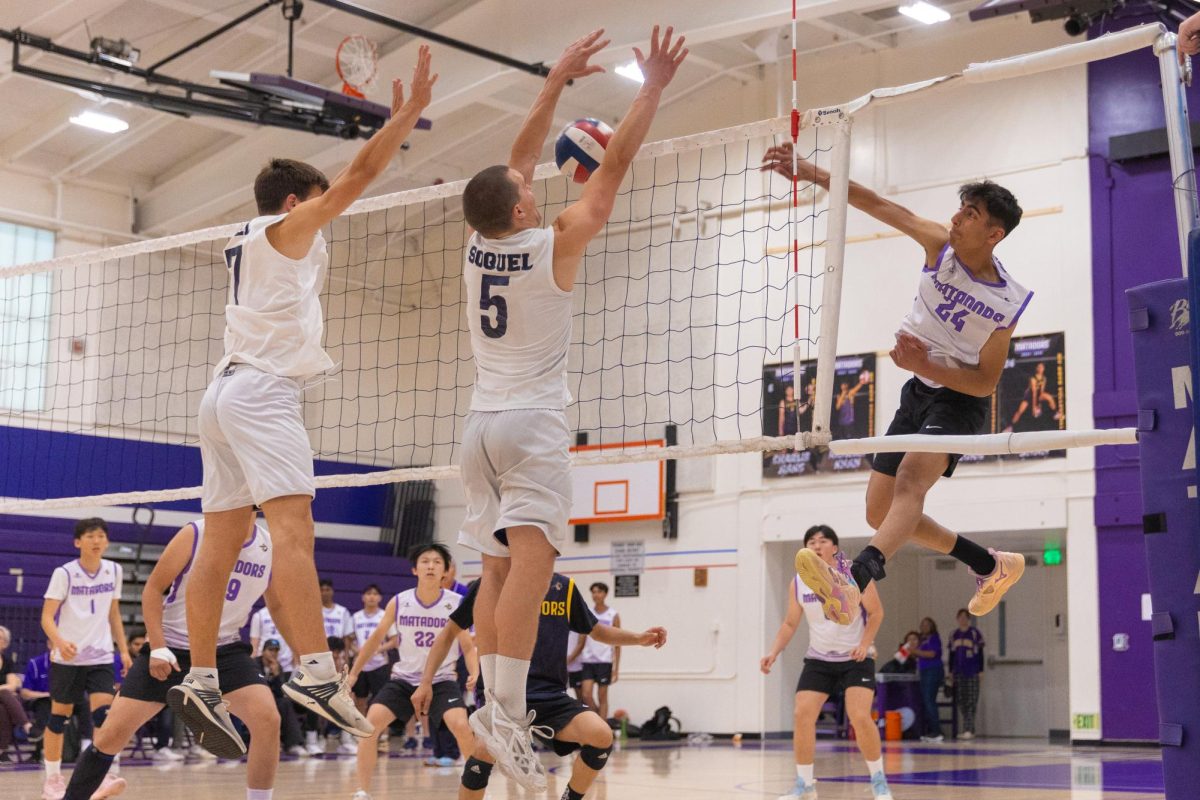EE: Hi everyone, my name is Arshiya Sen.
EE: And I’m Arushi Singh.
EE: Welcome to Episode 34 of Time Out! In this series, we explore the MVHS sports scene to learn more about the journeys of our very own athletes from various sports.
EE: Today, we are joined by senior Pranavi Annaluru, who speaks on her journey in a classical Indian dance known as Kuchipudi! Let’s get our groove on!
EE: When did you begin Kuchipudi?
PA: I started dancing when I was five, but I started learning specifically Kuchipudi when I was in fourth grade.
EE: Where did you take Kuchipudi?
PA: I took Kuchipudi at a studio ten minutes away with my teacher. Her name is Shirni Kanth, and I’ve been with her since I was in fourth grade.
EE: And what level are you in?
PA: In classical dance, there aren’t really specific levels, but after you complete your dance debut, or your Rangapravesam, then you’re a senior dancer, so I would say I’m a senior dancer.
EE: When did you start and why did you continue Kuchipudi?
PA: I started because my parents wanted me to be in an extracurricular that was more active. I continued because I fell in love with the dance style and how I was able to connect more with my culture through dance. Kuchipudi is a Telugu form of dance, and I am Telugu, so it made sense for me to continue. I felt like I learned more throughout the years.
EE: How has Kuchipudi affected your life?
PA: Well, Kuchipudi has affected my life in many different ways. First, because it is an art form, it really helps me wind down from the day. If I’m really stressed out because of school or other things that are going on, I feel like dancing just lets me be more free and be more present and relaxed in the moment. Also, culturally, it’s helped me connect a lot more with my Telugu culture. I’m able to connect more with my grandparents, because they don’t speak English, they only speak Telugu. I feel like through Kuchipudi, I’m learning a lot more about Hindu culture, and also specifically Telugu, so it helped me have more conversations with them.
EE: Can you share a memorable moment or achievement from your Kuchipudi career?
PA: I would say the most memorable achievement is performing my Rangapravesam, which is a dance debut, and it’s one that I performed in ninth grade summer. It’s a three hour solo dance recital where you basically show the mastery of the art. I would say that’s the most memorable, because I also started preparing for that a year before, so it was the most tiring one as well.
EE: What are some things that went into preparing for the Rangapravesam?
PA: My Rangapravesam consisted of six different songs, which are all different song lengths. We had to pick the songs, and then my teacher would choreograph them, and I helped a little bit. After that, you just basically perform run throughs of all of your songs over and over again for the year. A way to get over my stage fright was to perform all my songs at small temples or parks, whatever chance I could get, so I would be able to make sure I have the stamina to perform for three hours, and also that I would not freeze on stage.
EE: What are some challenges that you’ve faced in Kuchipudi and what measures have you taken to overcome them?
PA: One of the biggest challenges I faced is my shyness. I used to be a really shy kid, so that was reflected in my dance, because Kuchipudi is a very expressive dance form, and you have to be expressing all the emotions. As someone who’s really shy, it was really hard for me to open up and do all those things. To overcome them, I had to step out of my comfort zone and perform at these temples where, random people were just watching me, and I had to deal with it and not think too much about what they were saying about me, and also making sure that I’m asking questions about what I’m doing wrong or right to my teachers and my family because they’re the audience, they’ll know what I’m doing wrong more than what I’m doing myself.
EE: Awesome. How do you balance your dance commitments with schoolwork?
PA: I don’t consider Kuchipudi as a very grueling extracurricular activity. I think of it as really fun, so I think of it as a break from my school life. Whenever I feel like I have too many things going on, then I’ll take a few minutes of break, and then I’ll dance, and that helps me regroup. Balancing it wasn’t that hard, because I put it as a different category than my other extracurriculars.
EE: Are there any specific rituals or traditions that you have before competition or performance?
PA: Before really big performances, we do a small puja to Nataraja, which is the dance God in Hindu culture. After we do that, we also have something called the Namaskaram in dance, a small movement to pray to the ground, because you’re stepping on it and dancing for it, and that’s pretty much the ritual.
EE: You mentioned how when dancing in front of an audience you get critique back to help improve your form. How important is teamwork and audience participation in a seemingly individual sport like Kuchipudi?
PA: I think that it’s important in a sense mainly because when you’re in a very big stage, the audience kind of seems really big and bright and it’s hard to not pay attention. But teamwork is a really big part. I’ve been dancing with the same group of five girls since I was in fourth grade, and two of them actually did the Rangapravesam the same summer that I did, so all three of us kind of trained together for the year, and that was really important to me, because during the tough training sessions and everything, I could lean on them for support, because they were also going through what I was going through, and they understood the pressure and the hardships.
EE: How do you stay motivated during tough training sessions or just staying consistent with your sport?
PA: There are a few songs that you have to do that are a lot more tiring. And through those, I kind of just look back at what the song actually means and try to connect more with the emotion of the song, because that helps me get through the piece a lot easier. Also, like I said before, I like to lean on my teammates for support. Obviously, I don’t perform with them all the time, but most of the time, they’re there to support me, even if it’s a solo performance. So I am glad that I have that to help.
EE: What are your goals for your future in Kuchipudi? Do you plan on pursuing this in college as well?
PA: Yeah, I definitely want to pursue it in the future. I tried to make sure to find a college that had a lot of Indian culture so I could continue it, because I really don’t want to let it go. Especially after my Rangapravesam, I think a lot of people kind of step back, and I’ll admit, I’m not as aggressive in the dance form as I used to be, but I definitely want to continue to perform and maybe even choreograph a few pieces in the future.
EE: Awesome. What advice would you give to aspiring Kuchipudi participants as they begin their Kuchipudi journey?
PA: The most important thing, I would say, is to really open up to your teachers, because my teacher is the one person that stayed with me through the whole 10 years, and she’s the one who gives the most critiques and criticism. If there’s anyone that you should open to and ask questions about, it’s your teacher. Also, really be present in the moment and connect with the song, because that also helped me a lot in opening up and deciding if this is what I want to pursue in the future.
EE: That’s it for Episode 34 of Time Out. Thank you to Pranavi for joining us today! I’m Arshiya Sen.
EE: And I’m Arushi Singh. Thanks for tuning in!










